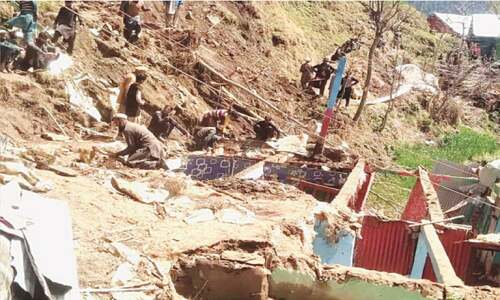PESHAWAR: All the districts, except Peshawar and Abbottabad, in Khyber Pakhtunkhwa don’t have nursery wards in public sector health facilities to provide specialised treatment to the newborn babies during the first 28 days of their birth and control avoidable mortalities.
The paediatricians say that nursery wards exist in three hospitals in Peshawar and one health facility in Abbottabad that receive patients from the whole province. The newborns were prone to many illnesses due to their weak immunity level and required health services in the nearest hospitals in native areas, they added.
In Peshawar, the three medical teaching institutions on average admit three patients on the same bed in nursery wards for lack of space and increasing number of referred patients.
The health experts told this scribe that Lady Reading Hospital had a 40 bed-nursery ward for neonates, Khyber Teaching Hospital had 35-bed ward and Hayatabad Medical Complex had 20 beds for newborns on which children triple to their capacities were admitted.
Experts say newborns need health services in their native areas
They said that common health issues among neonates were prematurity, low birth weight and perinatal asphyxia (oxygen deficiency at birth) that were manageable through infrastructure and trained and well-equipped health workers. In Pakistan, about 54 of 1,000 neonates died per day and half of them expired for want of treatment, they added.
A member of the provincial chapter of Pakistan Paediatrics Association said that the province required nursery wards at district and tehsil level to bring down mortalities because many children died while being transported to Peshawar. “Private maternity homes should have been asked to establish nursery wards to manage newborns,” he said.
Dr Vikram Kumar, a junior consultant neontologist at Indus Hospital Karachi, said that they were undertaking a study to ascertain the presence of human resources, equipment, beds and medical staff in Khyber Pakhtunkhwa on the pattern of Balochistan where they conducted a detailed survey during April-June 2020.
“Our main aim is to assess the availability of birth facilities of different categories, neonatal care facilities, neonatal care services, number of related faculty, nursing staff and healthcare person verses patient ratio,” he said.
Dr Vikrim said there was a need to establish quality healthcare facilities for neonates in Khyber Pakhtunkhwa and former tribal areas. “We want to point towards substantial gaps in the availability of essential newborn care services and professionals. The improper handling of neonates by untrained staff leads to severe complications,” he added.
He said that the country had 5.6 doctors per 10,000 population and 8.1 nurses for newborns. He said that shortage of trained midwives was also one of the major constraints to accessing newborn care like the services for adult population. In order to save lives of newborns and improve equity in child survival, healthcare facility capacity to provide those services must also be enhanced, he added.
Dr Vikrim said that neonatal care in the country slightly improved over the years but it was still lacking among major health facilities. “Pakistan ranks second in Global Neonatal Mortality Rate (NMR), averaging to 42 neonatal deaths per 1,000 live births,” he added.
According to him, healthcare system in Khyber Pakhtunkhwa comprises state-financed facilities and private facilities including both accredited and unregulated hospitals. “The public sector hospitals include basic health units, rural health centres, referral hospitals and tertiary level hospitals where access to services is hampered by long distances to facilities, restricted hours of operation, poor hospital infrastructure and financial barriers and drugs,” he added.
Published in Dawn, March 1st, 2021
















































Dear visitor, the comments section is undergoing an overhaul and will return soon.